#Feminist theory
Explore tagged Tumblr posts
Text
You all realize Feminists have been critiquing "women only spaces" for decades right?
I think often about Audre Lorde's critique of a women only event that welcomed her wife and daughter, but not her son. Because she questioned it - the function and purpose of barring even the sons of Feminist women from Feminist events. Especially the barring of her young Black son, who would otherwise be left alone in the city where he would be more prone to the very violence those same Feminist women claimed to want to change.
Because what functional, forward thinking Feminist purpose does it actually serve to do that? What message does that send to women with sons, husbands, brothers, lovers, friends, who want to involve the men and boys in their lives in their activism? Who want to build a functionally better world for us all outside of the oppressive grasp of Patriarchy? Especially for the marginalized men who often sit at their own intersection violent Patriarchal oppression, that still happens to be Patriarchal oppression despite it not being distinctly misogyny?
What purpose does it truly serve to sequester yourself away into a pocket of the world, detached from those you share it with? What bright and shining future does that really promise you?
#audre lorde#transandrophobia#<- that tag is more for visibility than anything else#though this is relevant to conversations on transfeminism on this website currently#transfeminism#intersectional feminism#feminism#feminist theory#intersectional feminist theory#transfeminist theory#mine#on gender segregation
5K notes
·
View notes
Text

"it's woman's responsibility to be assaulted correctly"
#feminist theory#feminist quotes#feminism#radical feminist community#radical feminist safe#radblr#radical feminism#radical feminist theory#radical feminists do interact
2K notes
·
View notes
Text
The 'women can wear pants' leaving peoples' bodies when a woman is trans.
#196#transgender#transsexual#trans positivity#trans women#trans nonbinary#transfem#trans woman#trans women are valid#trans pride#trans girl#queer rights#feminism#radical feminist safe#feminist#intersectional feminism#womens rights#feminist theory
648 notes
·
View notes
Text
some of you think your meek, patriarchal mothers never had any strong feminist attitudes in their youth and you do so to your own detriment. radicalized women have always existed. they were just neutralized by the patriarchal institution of marriage. that has consistently been one of the biggest threats to women's liberation and is the primary catalyst for women's widespread suffering in the first place.
718 notes
·
View notes
Text
I've been thinking a lot on why the 'GAY SON OR THOT DAUGHTER 😱😱' that was everywhere a few years ago got so popular. Its rooted in misogyny, that much is plain. It seems like an impossible choice for people in patriarchy because both options are interpreted as a person being used for sex by men, specifically being penetrated by men, or multiple men. You know that the 'gay son' in this dilemma will almost always be taken as feminine, and being feminine is being like women, women get penetrated and used by men, being penetrated is a fundamental humiliation on women's part, and now because this gay son fits the 'woman' role, he is also fundamentally humiliated. A man having sex with multiple women conquers each of those women, while a woman having sex with multiple men is conquered by each and every one of those men. Sex for women is inherently humiliating because of their internal sexual organs that can be penetrated, so women should keep that humiliation to a minimum and only let one man conquer them.
It's the way the sexual model of male=external sex organs=active= conqueror and female=internal sex organs=can be acted upon=conquered forms the basis for the subject/object dichotomy that forms the basis for patriarchy and all misogyny.
#All this rambling analysis from a years old joke that's my hobby#feminist theory#radblr#radical feminist#radical feminism#radical feminist safe
284 notes
·
View notes
Text
penises are so ugly. like why do they look like that. who designed them. who approved this. absolute failure of graphic design. 💀
#feminism#the outsiders#the outsiders 1983#the outsiders darry#the outsiders ponyboy#womens rights#sexism#intersectional feminism#feminist theory
218 notes
·
View notes
Text
marxist feminism
as much as i appreciate and agree with marxist feminism and what it has done for feminist theory and organizing, when they (Marxist feminists) start talking about how women's oppression stems from capitalism they lose me. the patriarchy predates capitalism, after the fall of capitalism patriarchy will still be here.
#marxist feminism#marxist#marxism#feminist theory#feminism#anti capitalism#fuck capitalism#capitalism#patriarchy#fuck the patriarchy
158 notes
·
View notes
Note
They butchered all female characters and it's true, but people can simply don't like Sansa's chapters or don't enjoy her character because she's classist. She thinks bastards are beneath her in earlier chapters and in Alyanne. She's disgusted by Arya spending time with Butcher boy and other peasants because they're beneath her.
I'm not saying she's s bad person or the worst one or that we should blame her for being passive while being hostage. She's a kid, she's s victim, she can still have a positive change. but I'm reminding that saying people are misogynist because they don't like her is a reach. And it's not that people hate her, they just point out things she did or thought about in canon and her fans scream "you hate her! You hate women!" No. It's okay to not like a character, you can point out their flaws, it doesn't make you a mysoginist.
Oh, trust me, the issue isn’t that people simply don’t like Sansa—it’s why they don’t like her and the patterns that emerge when you look at how traditionally feminine female characters are treated in fandom discourse.
See, I don’t care if someone criticizes Sansa for her classism. That’s a valid discussion. I don’t care if someone dislikes her personality. Not every character is for everyone. But let’s not pretend that the dominant criticism Sansa gets in fandom spaces has ever been about her early prejudices. No one’s out here writing essays about how Sansa Stark needs to deconstruct her internalized feudal biases. What do we see instead?
“Sansa is useless.” “She’s weak.” “She’s stupid.” “She just stands there and does nothing while other people suffer.” “She should have done something.”
And that’s where misogyny enters the chat.
Because when you actually break these takes down, what they boil down to is that people resent Sansa for not being proactive in the way that they think a strong female character should be. She’s written as a character whose resilience is passive rather than active, who survives through adaptability rather than aggression, and fandom hates that. This is a known trend in media reception.
Feminist film and literature studies have examined this bias for decades. De Beauvoir discusses how femininity is traditionally coded as passive, and because of that, it is devalued in comparison to traditionally masculine-coded traits like physical strength, direct confrontation, and assertiveness. Susan Faludi discusses how women who embody traditional femininity often face more ridicule than those who adopt “strong” or “unconventional” roles. And the male gaze, as theorized by Laura Mulvey, conditions audiences to respond more favorably to female characters who are active participants in traditionally masculine-coded spaces—combat, strategy, direct rebellion—while dismissing those who navigate systems through softer, less immediately visible means.
Sansa fits this mold perfectly. She does not fight with a sword, she does not make grand speeches, she does not take direct violent action, so fandom deems her “useless.” But here’s the catch—this standard is not applied equally.
Think about how Tyrion is treated for his ability to navigate the political landscape through words rather than force. Is he called “useless” for not picking up a sword and charging into battle? No—because intellect and political maneuvering, even when nonviolent, are still considered active and thus valuable in a way that Sansa’s more passive survival is not.
Now, compare Sansa’s treatment to Arya’s. Arya is beloved in fandom spaces, and yes, she has her own set of haters, but notice how different the tone of that criticism is. Arya is rarely called “useless.” She is rarely ridiculed for being afraid. She is allowed to be traumatized, to make mistakes, to be messy and complicated in ways that Sansa is not—because Arya performs a more masculine-coded form of resilience. She fights, she kills, she runs, she rebels.
And just to be clear, none of this means that Arya’s arc is bad or that her popularity is undeserved. The problem isn’t that Arya is liked—it’s that traditionally feminine resilience is not. The issue is that Sansa is not disliked because of her flaws in isolation, but because those flaws reinforce her femininity, and femininity is what people are actually responding negatively to.
This is why calling Sansa hate misogynistic is not a reach. It’s not about saying that everyone has to like her. It’s about looking at the larger pattern of why she is dismissed, why she is mocked, and why so many people cannot accept a female character whose form of strength does not align with masculine-coded ideals.
So no, I’m not saying that every single person who dislikes Sansa is a raging misogynist. But I am saying that if your criticism boils down to “she’s useless, she’s weak, she’s stupid,” you should probably examine why those specific critiques keep coming up for female characters who embody traditional femininity. Because it’s not a coincidence.
#sansa stark#sansa stakr defense#asoiaf#a song of ice and fire#got#game of thrones#female in media#feminist theory#feminist film theory#feminism#female characters
75 notes
·
View notes
Note
Someone smarter than me needs to do an in-depth analysis on how swift weaponizes sex. So many of her lyrics involve cheating as revenge and picking fights with her partners about other girls. She makes it sound like some godly privilege to be with her and if she masterminded her way into your life you're just soooo lucky. Even "touch me while your bros play GTA" plays into that. Like "why would you want to have fun and game with your friends when ill let you finger me". (Sidenote a bunch of her lyrics and all of Me! sounds like an abusive partner daring you to leave and dare to find someone better) It's creepy how she's so juvenile and egotistical at the same time. She's mastered the "any mention of my bfs, even the underage ones, is slutshaming" move and uses it to get out of any criticism. Like, have all the sex you want be safe whatever but don't act like some sad little girl who got taken advantage of when the game you started goes poorly.
Ask, and ye shall receive. Because this a very insightful observation! Thanks!
It is true that Swift clearly uses sex and sexuality like a "gotcha" moment. I was always quite perturbed by her songs that glorify cheating. It's just so strange, but I think it ties into her enjoyment of revenge fantasies. Anyway, I was planning to write about how Swift's music often engages with and reinforces heteropatriarchal social standards. I think your idea adds an interesting new layer to the ways in which she manipulates through sex- both in the performance of passivity to masculine authority, as the patriarchy, and the ways in which she commodifies female sexuality by weaponizing it.
You're right it's incredibly egotistical and juvenile.
Also, I have a major bone to pick with the way Taylor Swift uses feminism to shut down criticism- like OMG do I have a problem with her there. She's only ever spent her career crying about how "women who talk bad about me are bad women" yet, she never really does or says anything actually feminist. In fact, most of her music, like I said above, reinforces the patriarchy. She herself is guilty of so much slut-shaming, too. I will go into detail, with a real argument, in a separate post soon. And I thank you for pointing out the weaponized sexuality aspect of her, often, overtly patriarchal tone.
BTW- "ME!" is Such a weird song -> "I know that I went psycho on the phone" uhh... excuse me?
#anti taylor swift#anti swifties#ex swiftie#patriarchy#heteropatriarchal social standards#feminist#feminist theory
233 notes
·
View notes
Text
I’d like to read into some feminist theory books, but I don’t really know where to start. Anyone have any suggestions?
100 notes
·
View notes
Text
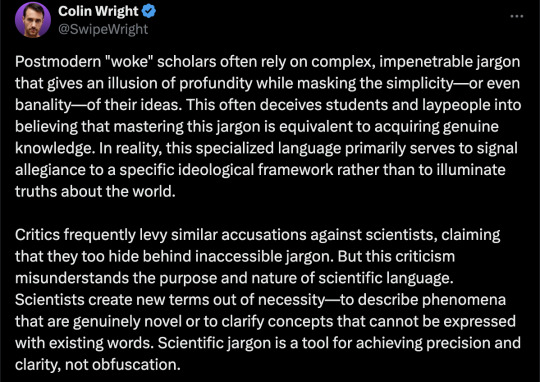
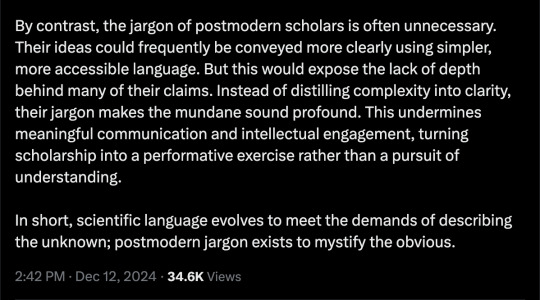
youtube
https://www.merriam-webster.com/dictionary/specious
1 : having a false look of truth or genuineness : sophistic specious reasoning 2 : having deceptive attraction or allure 3 obsolete : showy
--
Noam Chomsky: If you look at what's happening, I think it's pretty easy to figure out what's going on. I mean, suppose you are a literary scholar at some elite university. Or, you know, anthropologist or whatever. I mean, if you do your work seriously, that’s fine, you know. But you don’t get any big prizes for it.
On the other hand, you take a look over in the rest of the university and you’ve got these guys in the physics department and the math department and they have all kinds of complicated theories, which of course we can’t understand, but they seem to understand them. And they have, you know, principles and they deduce complicated things from the principles and they do experiments and they find either they work or they don’t work. And that’s really, you know, impressive stuff.
So I want to be like that too. I want to have a theory. In the humanities, you know, literary criticism, anthropology and so on, there’s a field called theory. We’re just like the physicists. They talk incomprehensibly, we can talk incomprehensibly. They have big words, we’ll have big words. They draw, you know, far-reaching conclusions, we’ll draw far-reaching conclusions. We’re just as prestigious as they are.
Now if they say, well look, we’re doing real science and you guys aren’t, that’s white male, sexist, you know, bourgeois or whatever the answer is. How are we any different from them?




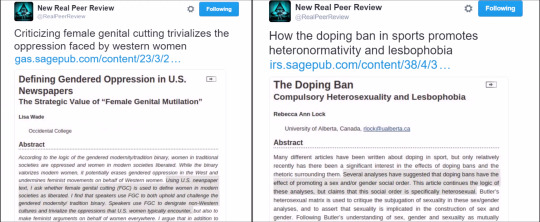
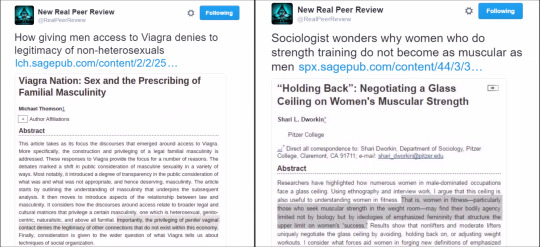
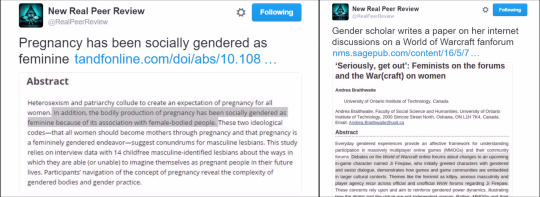
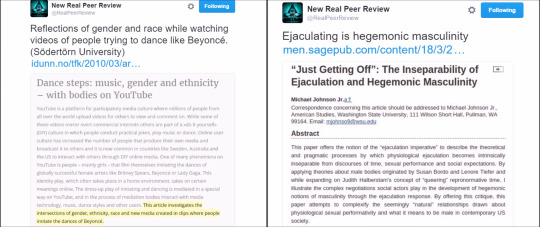
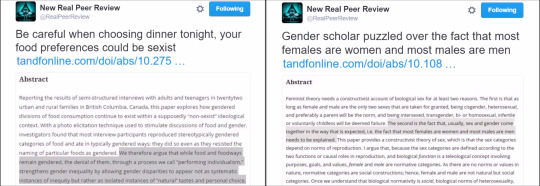
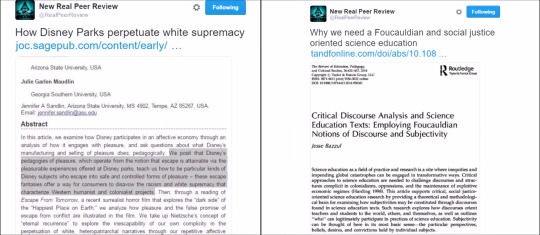


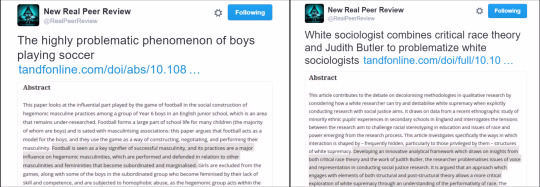
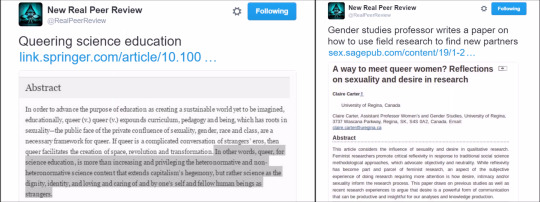

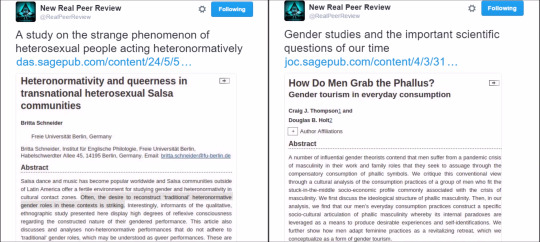
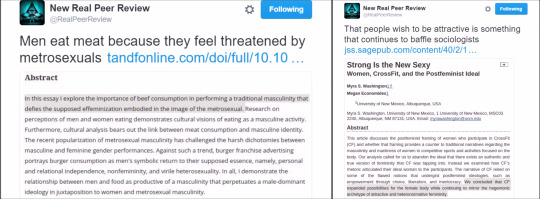
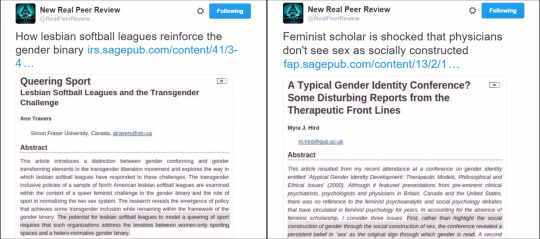
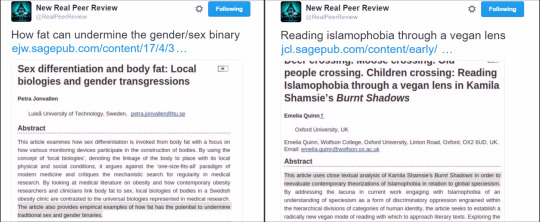
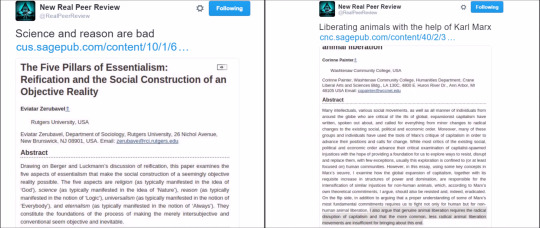
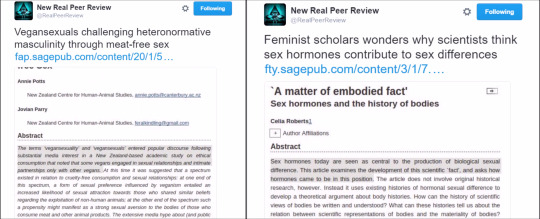
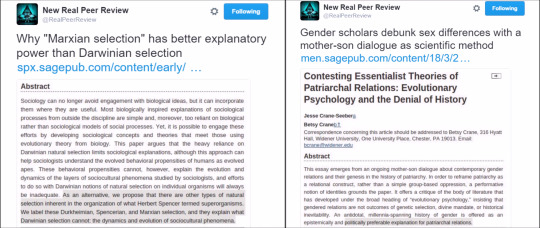

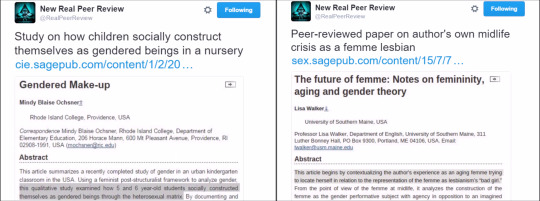
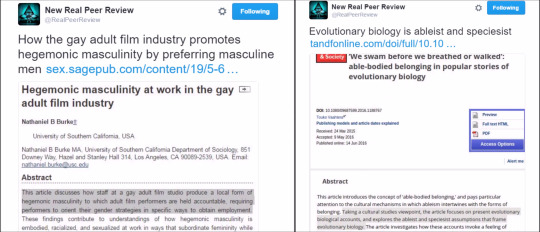
==
I worry that when I describe this idiocy as "fraud," people think I'm exaggerating, being hyperbolic or otherwise overstating it.
I'm not. If anything, I'm understating it.
All of this postmodern crap we're dealing with is completely fake. All this ridiculous intersectional jargon is a big grift. All of these domains producing this ridiculous nonsense are bogus and corrupt. All the scholarship they produce is fraudulent. It's fake from top to bottom.
All of it.
These people are cloaking asinine retardation in fancy words to cover up how asinine and retarded this asinine retardation is.
The people producing it are shallow and stupid. Not to mention, envious and spiteful about the status and authority of science. They just use absurd jargon to hide that fact and trick you into thinking it's too deep and profound for you to understand. But when it's decoded into simple English, à la the Tweet summaries above, the retarded, moronic nature becomes obvious.
The response to this kind of ridiculous shit needs to be laughter and derision, not tenure or a tertiary qualification.
We have to get rid of it because it's destroying our societies.
#Colin Wright#postmodernism#woke doctrine#feminism#feminist theory#woke nonsense#social constructivism#academic fraud#defund gender studies#gender studies#academic corruption#critical theory#critical race theory#intersectionality#intersectional feminism#patriarchy theory#patriarchy#science#what science is#religion is a mental illness
68 notes
·
View notes
Text

Excerpt from a new essay I'm writing.
41 notes
·
View notes
Text
Has anyone else realized that the Madonna/Whore dichotomy does not encompass all women, because there's pretty much always been a set of women who existed outside the dichotomy since the beginning? It's the women who were considered too undesirable to fit into the Whore side and too stuck up to fit into the Madonna side, and too man hating for either side. The old maid, the spinster aunt, the ugly women, the plain boring or bookish women, the old witches, the nagging old women, the LESBIANS. And recently, the harpy feminists, the lonely cat ladies, the weird girls. they've been around as long as this dichotomy has existed in the patriarchal conscious
#feminist theory#radblr#Found what's been bothering me about that complex#radical feminist#radical feminism#radical feminist community#radical feminist safe
252 notes
·
View notes
Text
If you think of transfeminism only in ways that suggest the sole focus is about trans women, believing something like "(trans)feminism doesn't focus on (trans) men", you have missed the forest for the trees
#transfeminism#transfeminist#trans feminism#intersectional feminism#feminism#feminist theory#trans inclusive feminism
31 notes
·
View notes
Text
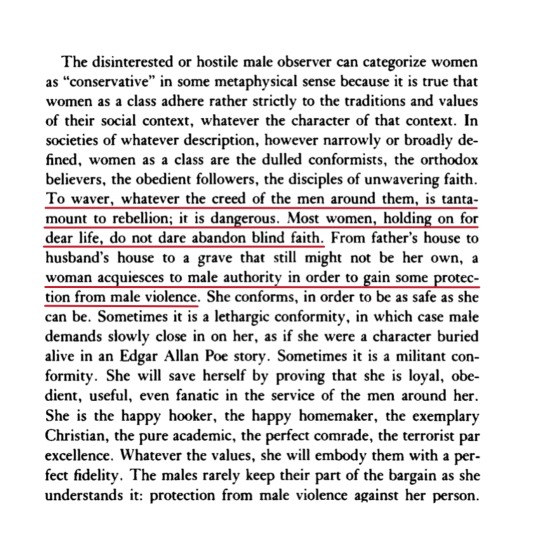
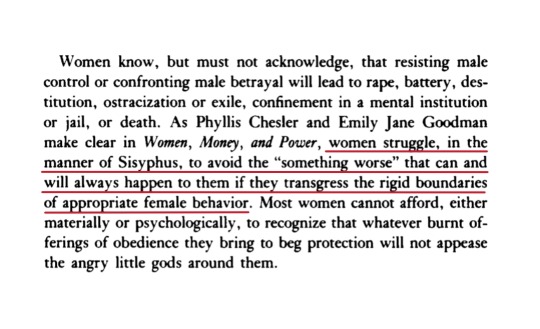
Andrea Dworkin, 'The Promise of the Ultra Right', in Right-Wing Women (1983)
#i genuinely think this is one of the most valuable feminist texts we have#if you want to understand trad fems / pro-life women / quiverfullers / antifeminist women#or any woman who seems to act against her own interests#THIS is the text you need to read#and i think if we all had we'd have a much easier time uniting as a class across political divides#andrea dworkin#promises of the ultra right#right-wing women#feminism#feminist theory#feminist text
631 notes
·
View notes
Note
Jk mocked the girls for liking girls’ stuff? And divination is a girls subject? Not a hate q i genuinely dont know
Yes, J.K. Rowling does mock girls for liking traditionally "girly" things, and the way Divination is portrayed in the series is a clear example of how she reinforces gendered stereotypes.
First, let’s establish that there are no inherently "girls’ things" or "boys’ things"—those are social constructs reinforced through culture and media. Activities, subjects, and interests are gendered based on historical and cultural biases, not any inherent difference in ability or preference.
Now, in the books, Divination is depicted as a frivolous, unreliable subject, associated primarily with women. Professor Trelawney is portrayed as an eccentric, dramatic, and incompetent woman whom most characters—particularly Harry, Ron, and even McGonagall—mock. Lavender and Parvati, two of the few explicitly feminine-coded girls in the series, are shown to adore Divination, which further cements the idea that it is a "silly" subject. Compare this to more "serious" subjects like Transfiguration, Potions, or Defense Against the Dark Arts, which are taught by men (or McGonagall, who is depicted as strict, rational, and unlike "typical" women). The underlying message is that things associated with femininity are less valuable and worthy of ridicule.
Beyond Divination, there’s a pattern of dismissing and mocking things that are coded as "girly." Ginny, for example, is embarrassed for having a crush on Harry in CoS, as if romantic feelings—often associated with femininity—are something to grow out of. Hermione, despite being a well-developed character, is at her most ridiculed when she shows interest in emotions or beauty (e.g., her relationship with Krum, the Yule Ball, or her emotional reactions to Ron). The books consistently position more "traditionally feminine" behaviors as weaknesses or sources of humor.
This kind of messaging reinforces harmful stereotypes. When a book aimed at children presents "girly" interests as trivial or laughable, it teaches young readers—especially girls—that their passions and identities are less valid if they align with traditionally feminine things. It upholds the idea that to be taken seriously, one must reject femininity, which is a deeply ingrained misogynistic belief.
So yes, Rowling does engage in this kind of gendered mockery. It might not be intentional, but intent doesn’t negate impact.
#jk rowling#jk rowling hates women#jk rowling is misogynistic#misoginy#media misoginy#feminist theory#feminist media stidues#feminist critic#female characters#female characters in media#women in media#gender constructions#gender bias#lavender brown#hermione greanger#ginny weasley#parvati patil#professor trelawney#trelawney#professor mcgonagall#mcgonagall#harry potter#harry potter women#harry potter gender critical#harry potter girls
22 notes
·
View notes